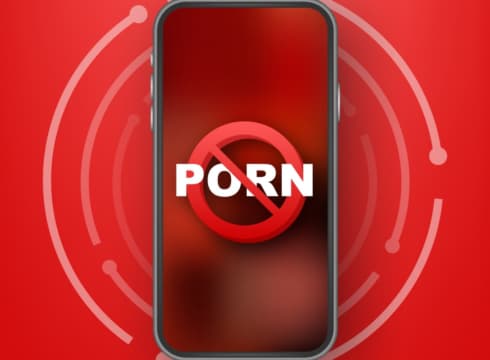Internet service providers (ISPs) have been directed to immediately submit a compliance report in the matter.
63 websites find mention in DoT circular while the rest 4 have been banned in response to an order of the Uttarakhand HC and MeitY
Previously, the government had also banned around 827 porn websites in 2018
Inc42 Daily Brief
Stay Ahead With Daily News & Analysis on India’s Tech & Startup Economy
The Department of Telecommunications (DoT) has issued orders to immediately block access to 67 pornographic websites under the new Information Technology (IT) Rules.
Internet service providers (ISPs) have been directed to submit a compliance report in the matter. The diktat will block access to the websites on users’ phones and laptops.
Of the total, 63 websites find mention in a circular posted on the DoT website while the rest 4 have reportedly been banned in response to an order of the Uttarakhand High Court (HC) and directions issued by the ministry of electronics and information technology (MeitY).
“Kindly find the attached Judicial Magistrate First Class, Court No.6, Pune, Maharashtra order dated 23-09-2022, in the case OW No. 303 of 2022 forwarded by MeitY vide email dated 24.09.2022 for necessary action with respect following sixty-three (63) websites/URLs mentioned in the court order,” added the order.
The order was issued via powers vested with the government under the new IT Rules, 2021. The Act bars content that ‘shows such individual in full or partial nudity or shows or depicts such individual in any sexual act or conduct.’
Interestingly, the orders were purportedly passed under rule 3(2)(b) of the IT Rules, which largely deals with revenge porn, but the circular appears to have banned a broad set of unrelated sites in the process.
This is the second round of bans on pornographic websites since 2018. Back then, authorities had blocked access to 827 porn websites on the orders of Uttarakhand HC. It is pertinent to note that while the HC had sought a ban on 857 such websites, the government had spared 30 websites as no pornographic content was found hosted on these websites.
The Bans And Free Speech Debate
The ban has revived apprehensions of moral policing by the government. Interestingly, the order comes in a country that has some of the higher viewership of porn in the world.
According to Semrush, Indians accounted for more than 3 Bn views on porn sites in August 2022. This number declined by over 73% compared to the same period last year. Of these, the top three websites namely xvideos, Pornhub and LuxureTV, accounted for more than 540 Mn views.
Most of these views emanate from smartphones, with a minuscule also emerging from laptops and computers.
Amidst all this, a majority of the banned porn websites continue to operate by unveiling mirror sites which redirect users to the same platform. While the previous ban failed to put a lid on viewership, this has not stopped the government from issuing the current diktat.
While many users had turned to virtual private networks (VPNs) to access pornographic content, the recent directives from CERT-In has also played spoilsport for many users looking to access the content.
The cybersecurity watchdog’s directions on mandating storing user data including personal data also saw the exodus of major VPN players including Surfshark and NordVPN from the country. This has complicated matters for users who used VPN to access websites which are currently barred in the country.
Back to the story, the circular has also raised questions over the sweeping powers of the new IT Rules. Previously, authorities have also used powers under this to ban a host of YouTube channels and social media handles for allegedly being detrimental to national security and issues related to public order.
Just this week, the government directed YouTube to block 45 videos hosted on 10 channels. Over the past one year, authorities have blocked 94 YouTube channels and 19 social media accounts since 2021 for a gamut of reasons, from fake news and disturbing the sovereignty and integrity of India.
Many critics have also been vocal about the usage of new IT Rules to muzzle free speech and dissent.
A case in point has been the Centre’s legal flashpoint with microblogging platform Twitter. The social media platform has dragged the union government to Court over content takedown orders. Arguing before Karnataka HC, Twitter, earlier this week, said that close to 50%-60% of tweets that the government asked it to block were ‘innocuous’, reflecting the subjective perspective of the contentious debate and regulatory overreach.
{{#name}}{{name}}{{/name}}{{^name}}-{{/name}}
{{#description}}{{description}}...{{/description}}{{^description}}-{{/description}}
Note: We at Inc42 take our ethics very seriously. More information about it can be found here.


